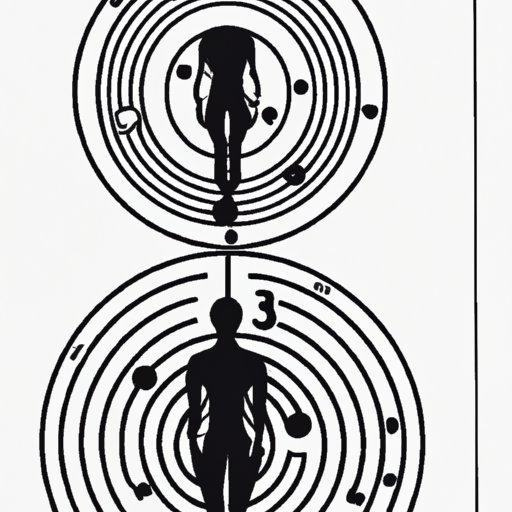
Introduction
Numerology is the study of how numbers influence our lives. By assigning meaning to specific numbers, numerology practitioners can reveal patterns, personality traits, and predictions for the future. Knowing your numerology number can provide a powerful tool for personal growth and development.
In this article, we will explore how to find your numerology number through a step-by-step guide. We will also address some common misconceptions about numerology and provide resources for further learning. Additionally, we will share a personal case study of how the writer has used numerology to guide their own growth.
Step-by-Step Guide to Finding Your Numerology Number
There are two parts to finding your numerology number: calculating your birth date number and calculating your name number. Here’s how to do it:
Calculation of Birth Date Number:
- Write down your birthdate in the format of MM/DD/YYYY.
- Add all the numbers in your birthdate together.
- If the sum is a double-digit number, add those two digits together.
- The final sum is your birth date number.
Calculation of Name Number:
- Write down each letter of your full name.
- Match each letter to its corresponding number value in the chart below:
A = 1, B = 2, C = 3, D = 4, E = 5, F = 6, G = 7, H = 8, I = 9, J = 1, K = 2, L = 3, M = 4, N = 5, O = 6, P = 7, Q = 8, R = 9, S = 1, T = 2, U = 3, V = 4, W = 5, X = 6, Y = 7, Z = 8
- Add all the numbers together.
- If the sum is a double-digit number, add those two digits together.
- The final sum is your name number.
Arriving at the Final Numerology Number:
- Add your birthdate number and name number together.
- If the sum is a double-digit number, add those two digits together.
- The final sum is your numerology number.
- If you get the number 11 or 22, do not reduce the number any further since those are considered master numbers in numerology.
Common Misconceptions About Numerology
There are many myths and misbeliefs surrounding the practice of numerology. Here are a few common misconceptions:
Numerology is a form of fortune-telling: While numerology can be used to make predictions about the future, it is not solely focused on fortune-telling. Numerology is a tool for self-awareness and personal growth.
Numerology is based on superstition: While numerology assigns meaning to numbers, it is not based on superstition. Numerology is backed by mathematical principles and can be seen as a branch of number theory.
Numerology is a religion: Numerology is not a religion, nor does it require any religious beliefs. It is a tool for personal growth and can be practiced by people of any faith.
For those interested in learning more, there are many resources available, including books, websites, and numerology practitioners who offer readings and consultations.
Personal Case Study
As the writer of this article, I wanted to share my own experience with numerology.
I discovered numerology in my early 20s and was immediately intrigued by the idea that numbers held such deep meaning. At the time, I was struggling with anxiety and uncertainty about my future. Numerology provided a framework for understanding myself and my purpose.
Through the process of determining my numerology number, I was able to see patterns in my life and make connections between my personality traits and the challenges I faced. I began to understand that my anxiety was tied to my personality type and that I could use this knowledge to manage my anxiety more effectively.
Since then, I have used numerology as a tool for personal growth. It has helped me understand my strengths and weaknesses, make decisions about my career and relationships, and gain perspective on my life’s purpose.
Importance of Numerology
Knowing your numerology number can provide valuable insights into your personality, strengths, and potential challenges. For example, if your numerology number indicates that you are a natural leader, this can guide you in choosing a career that aligns with this trait.
Numerology can also be used to gain insight into personal relationships. By understanding your partner’s numerology number, you can gain a better understanding of their strengths and challenges in the relationship.
Finally, numerology can provide guidance for personal growth. Knowing your numerology number can help you identify areas for improvement and provide a framework for setting goals and achieving personal fulfillment.
Alternative Methods for Finding Your Numerology Number
While the step-by-step guide provided in this article is the most common method for finding your numerology number, there are alternative methods as well.
Enneagram of Personality: The Enneagram is a personality system that assigns each person one of nine types. Each type is associated with a number, which can be used as a numerology number.
Chaldean Numerology: Chaldean numerology is an alternative numerology system that assigns different values to letters than the common system used in this article. Chaldean numerology is said to be more accurate than other numerology systems.
Other numerology systems exist outside of the mainstream, and each system may provide slightly different interpretations of your numerology number. It is important to research different numerology systems to find one that resonates with you.
Conclusion
Knowing your numerology number can provide valuable insights into your personality, potential challenges, and life’s purpose. By following the step-by-step guide provided in this article, you can easily calculate your numerology number. Remember that numerology is a tool for personal growth and development, not a form of fortune-telling or religion.
By learning about numerology and exploring its many applications, you can gain a better understanding of yourself and reach new levels of personal fulfillment.





